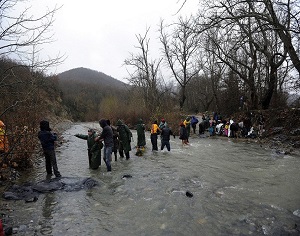Image: Refugees and migrants cross a river near the Greek-Macedonian border to return to Greece, after an unsuccessful attempt to enter Macedonia, west of the village of Idomeni, Greece, March 15, 2016. REUTERS/Alexandros Avramidis
![]()
By Kate Kelland
LONDON (Reuters) – Refugees fleeing war, violence and persecution have a much higher risk of developing psychotic illnesses like schizophrenia than people who migrate for economic or social reasons, according to research published on Tuesday.
Researchers writing in the BMJ Brit’sh medical journal said their findings suggest government healthcare officials in countries taking in refugees should plan to be able to help higher numbers of mental health patients.
Humanitarian crises in Europe, the Middle East, north Africa, and central Asia mean there are currently more displaced people, asylum seekers and refugees worldwide than at any time since Word War Two.
Refugees have a raised risk of mental conditions such as post traumatic stress disorder (PTSD) – which brings flashbacks and panic attacks and can render patients emotionally volatile – but until now little has been known about the risk of psychosis.
So a team from Sweden’s Karolinska Institutet and Britain’s University College London used national register data to look at more than 1.3 million people in Sweden, and tracked diagnoses of non-affective psychotic disorders among the population.
On a per capita basis, Sweden has granted more refugee applications than any other high-income country, the researchers said, and in 2011 refugees constituted 12 percent of the immigrant population.
Those studied included people born to two Swedish-born parents, refugees, and non-refugee migrants from the four major refugee generating regions: the Middle East and north Africa, sub-Saharan Africa, Asia, Eastern Europe and Russia.
Their results showed a total of 3,704 cases of psychotic disorders, with refugees given asylum some 66 percent more likely to develop schizophrenia or another psychotic disorder than non-refugee migrants. Refugees were also up to 3.6 times more likely suffer psychosis than the Swedish-born population.
The researchers said health officials in receiving countries should recognize the “need to take the early signs and symptoms of psychosis into account in refugee populations as part of any clinical mental health service response to current global humanitarian crises.”
In a commentary about the study, also published in the BMJ, Cornelius Katona, medical director at the Helen Bamber Foundation human rights charity, said Europe needed “a robust mental health response to the refugee crisis” and should try its best to reduce extra stresses imposed when migrants arrive.
“Consideration also needs to be given to the challenges that asylum seekers face during what is often a prolonged and distressing process,” he said. “These factors may include institutional detention, inability to work (and resultant deskilling and loss of self esteem), destitution and difficulty in accessing health and social care.”
See Reuters INSIGHT on migrant mental health
(Editing by Jeremy Gaunt.)
Copyright 2015 Thomson Reuters. Click for Restrictions.
Study-Finds-High-Psychosis-Risk-Among-Europe-s-Refugee-Migrants-media.jpg


